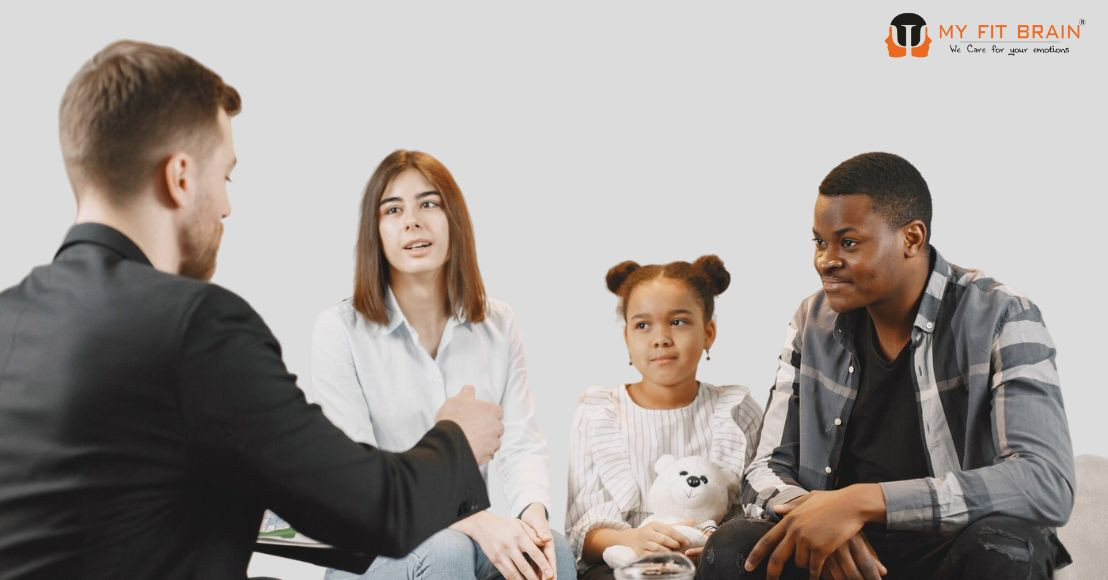Package of 5 Sessions
- Rs.5,999.00/-
When it comes to understanding what are hallucinations and what causes them you need to understand the olfactory hallucinations in the first place. In this type of hallucination, you might inhale fragrances ranging from delightful to unpleasant or even strange aromas which people cannot detect.
 Juhi Chohan
Juhi Chohan  03 Jan 2024
03 Jan 2024  Mental Health
Mental Health  3.2k Reads
3.2k Reads  8 min Read
8 min Read _1704276152.webp)
If you're wondering what are hallucinations and what causes them then you're on the right page as you can get all the details about. There are different types of hallucinations that you might face. The perplexing experiences manifest in different forms influencing how you perceive it. You also need to consider different ways to control overthinking.

When it comes to understanding what are hallucinations and what causes them you need to understand the olfactory hallucinations in the first place. In this type of hallucination, you might inhale fragrances ranging from delightful to unpleasant or even strange aromas which people cannot detect. In simple terms you can say that your nose is interpreting nonexistent smells, it leads you to believe that you are experiencing scents that nobody else around can sense. So it is very important for you to learn what are hallucinations.

When it comes to the different types of hallucinations people face you cannot truly ignore hallucinations related to the vision. These hallucinations unfold as a vibrant mental image or a scenario. You are basically detached from the real world. You can just compare it to viewing a movie or conjuring mental pictures. You must know that the visuals just exist within your imagination offering your unique and a surreal experience. It is just like having a private cinematic show in your mind. It creates an immersive visual landscape which is unique from the external reality. To get more details about this type of hallucination you need to understand what are hallucinations and what causes them.
Before you dive deep into different types you need to understand what are hallucinations and what causes them. Gustatory hallucinations dive deep into the world of taste perception without any tangible stimuli. It is as if your taste buds are responding to some flavors on your tongue. It can be delightful to disagreeable. There is an absence of actual food or drink. It is a sensory illusion of your taste buds reacting to something that is really nonexistent. It is all about exploring how your senses can deceive you.
Tactile hallucinations evoke the sense of physical contact without any external triggers. You might undergo the experience as you sense the presence of something or someone touching you despite the absence of the tangible source. You can compare it to feeling a touch stimulated by the imagery force. It prompts A perceived physical interaction that others cannot think about. There are several hidden signs of ADHD that you should know about.

Hallucinations linked with hearing introduced the perception of some sounds that others cannot hear. It mirrors the experience of hearing voices, music or noises without any external origin. And simple terms as if your ears are registering some sounds just solely within your thoughts constructing an ordinary encounter which is just exclusive to your internal world. It means people around you cannot hear it. So, it is very important for you to understand what are hallucinations and what causes them.
Besides learning what hallucinations are, you also need to understand the major triggers of hallucinations. Hallucinations are ideally perceptual experiences of things which are not present. It can be triggered due to different factors.
Your childhood trauma ranging from abuse to neglect can significantly shape your mental health. It fosters a vulnerability to hallucinations in your adulthood. The lingering emotional and psychological scars from traumatic experiences during the formative years might surface as vivid perceptual distortions later in your life. The mind marked by past trauma might conjure sensory perceptions which are not grounded in your present reality revealing the profound and enduring impact of your early adverse perceptions on your mental wellbeing.

One of the major triggers of hallucinations include lack of sleep. A lack of sleep deprivation beyond the occasional restless nights poses various threats to mental stability. It can potentially lead to hallucinations when your brain is deprived of essential rest it grapples with maintaining normal cognitive function it means the consequences of not getting enough sleep goes beyond tiredness it can induce a state where you receive sights and sounds that exists just in the world of imagination focusing on the fundamental connection between your rest and mental clarity.

When you engage in the consumption of certain substances like hallucinogens and excessive alcohol it can work like a catalyst For hallucinations in simple terms the use of drugs truly has the power to alter your perception it can create surreal and unreal sensory experience. When your mind is under the influence of such substances it might generate perceptions that deviate from the reality experienced by people who are sober, underlining the major role substances play in distorting the boundaries between what is real and what is not. So it is very important for you to understand what are hallucinations and what causes them.

Hallucinations are linked to chronic diseases that impact the brain like Parkinson's or Alzheimer's disease. In simple terms these conditions can impact your brain with time, and it can give rise to sensory perceptions, and they are detached from reality. It diverges from the external world. You can learn about the displacement of aggression also.

Some medicines intended to address specific health issues might inadvertently induce hallucinations like side effects. The drugs prescribed for your medical concern might unintentionally change your sensory experiences causing them to perceive things that are not a part of your objective reality. This highlights the emphasis that there is a need for potential side effects as what is intended to yield one aspect of your health might influence your mind in unexpected ways. It introduces a layer of complexity to the relationship between your medicine and perception. Doctors might also make you understand what is claustrophobia as it is closely related to this condition.
There are different ways to deal with hallucinations but the first thing that you need to learn is how to diagnose them.
You need to know that diagnosing hallucinations requires a comprehensive approach that considers different factors like contributing to perceptual disturbances. First, a clear detailed clinical interview is very important. It is very important for you to understand the frequency and the content of hallucination. It provides all the essential insights.
Psychiatric evaluations understand your mental health including mood disorders and psychotic conditions. Objective assessment is one of the best ways to deal with hallucinations. It includes testing your brain and it can help you identify the underlying neurological issues contributing towards hallucinations. Furthermore, investigating potential triggers like substance use, sleep patterns and trauma history is very important. You can also learn what is paranoid personality to deal with instantly.
Collaboration with different healthcare experts like psychologists ensure a holistic evaluation. The diagnostic and statistical manual of mental disorders work like a guiding tool for clinicians offering standardized criteria. Constant monitoring and reassessment is very important to refine the diagnosis. You need to consider the dynamic nature of hallucinations. A multidimensional diagnostic approach includes subjective reports, objective assessments and collaboration among different doctors. It improves accuracy and facilitates customized treatment plans for you if you are experiencing hallucination. You can also check out the different tips to deal with hallucination.
One of the best tips to deal with hallucination is to take the treatment at the right time. The treatment includes A multifaceted approach considering both psychological and physiological factors. From coping strategies to innovative medical interventions there are some avenues in the treatment of hallucinations.
It is one of the best treatments for hallucinations. Coping strategies play a very important role in managing your hallucinations. You can use techniques like cognitive behavioral therapy as it provides you with tools to challenge and reframe disordered perceptions. It empowers you to navigate and reduce the impact of their experiences in your daily life.


If you are experiencing severe hallucinations linked with psychiatric conditions antipsychotic medicines can play a very important role. These medicines can help you regulate your neurotransmitters in the brain, help you get rid of the symptoms and provide you with a stabilizing effect on perception forming a cornerstone in the pharmacological management of your hallucinations.
You must know that hallucinations are the perceptual experiences of stimuli which do not exist. They stem from a different variety of sources like childhood trauma, sleep deprivation, substance use, chronic ailments and of course some medicines. These occurrences underscored the intricate interplay between mental health and neurobiology and external influences.
Even though they are diverse in origin the common thread lies in disruptions to normal cognitive processes. Furthermore, research and awareness is very important for refining your diagnostic and treatment strategies.
Psychotherapy can be really helpful in getting to know more about hallucinations.
You need to know that hallucinations can result from different factors like childhood trauma, sleep deprivation, substance use and some medicines. You need to understand these triggers to develop targeted interventions and a comprehensive treatment plan.
You need to know that some of the most common symptoms of mental illness can also include hallucinations. It includes bipolar disorder or severe depression. These conditions might disrupt your normal cognitive process. Proper diagnosis and treatment is very important if you want to deal with these hallucinations.
It is very important for you to diagnose hallucinations and it includes clinical interviews, psychiatric evaluations and of course objective assessments like neurophysiological testing. You can identify the potential triggers like trauma or substance abuse, and it is very important for accurate diagnosis and the development of the right strategies.
You can use some coping strategies like cognitive behavioral therapy and also you can empower yourself to go through some lifestyle changes like stress management and optimizing your sleep patterns. Online counseling can be really helpful here.
Yes of course you can take some medical treatments for hallucinations like antipsychotic medications that regulate your neurotransmitters in the brain. Some of the innovative approaches include transcranial magnetic stimulation and it offers you noninvasive interventions while highlighting the evolving landscape of the treatments.


Families are living ecosystems. When one component is impacted and the enti...
 06 Nov 2025
06 Nov 2025  8 min Read
8 min Read 16 Reads
16 Reads 

Family is the basis of growth, emotional support, and belonging; however, e...
 04 Nov 2025
04 Nov 2025  8 min Read
8 min Read 77 Reads
77 Reads _1761824406.jpg)

Each strong relationship doesn't develop in a single day; it's nurt...
 30 Oct 2025
30 Oct 2025  8 min Read
8 min Read 176 Reads
176 Reads _1761717499.jpg)

The sexual fantasies of a person are an innate aspect of human sexuality th...
 29 Oct 2025
29 Oct 2025  8 min Read
8 min Read 1 Read
1 Read 


_1761824406.jpg)


_1761824406.jpg)
_1761717499.jpg)